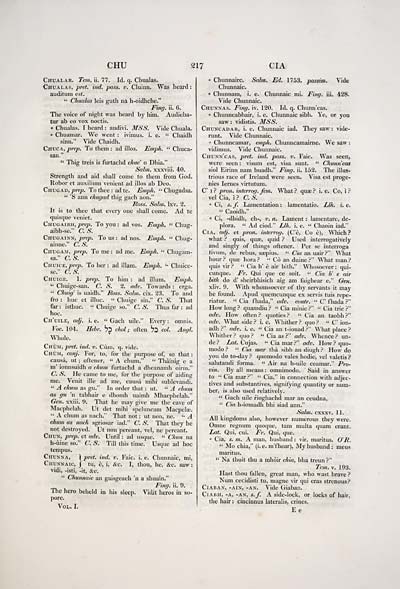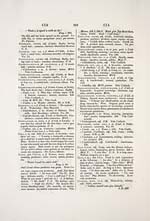Download files
Complete book:
Individual page:
Thumbnail gallery: Grid view | List view

CHU 217
CIA
Chualar. Teni. ii. 77. Id. q. Chualas.
Chualas, pret. hid. pass. v. Cluinn. Was heard :
" Chualas teis guth na h-oidhche."
The voice of night was heard by him. Audieba-
tur ab eo vox noctis.
• Chualas. I heard : audivi. MSS. Vide Chuala.
» Chuamar. We went : ivimus. i. e. " Chaidh
Sinn." Vide Chaidh.
Chuca, prep. To them : ad illos. Emph. " Chuca-
" Thig treis is furtachd chuc' o Dhia."
Salm. xxxviii. 40.
Strength and aid shall come to them from God.
Robor et auxilium venient ad illos ab Deo.
Chugad, prep. To thee : ad te. Emph. " Chugadsa.
" 'S ann chugad thig gach aon."
Ross. Salm. Ixv. 2.
It is to thee that every one shall come. Ad te
quisque veniet.
Chvcaibh, prep. To you: ad vos. Emph. " Chug-
aibh-se." C. S.
Chugainn, prep. To us : ad nos. E?nph. " Chug-
ainne." C. S.
Chvice, prep. To her: ad illam. Emph. '• Chuice-
se." as.
Chuige. 1. prep. To him : ad ilium. Emph.
" Chuige-san. C. S. 2. adv. Towards : erga.
" Chuig' is uaidh." Boss. Salm. cix. 23. To and
fro : hue et illuc. " Chuige sin." C. S. That
far: isthuc. "Chuige so." C. S. Thus far : ad
Ch'uile, a(^. i. e. " Gach uile." Every : omnis.
Voc. 104. Ilebr. b2 chol ; often ^3 col. Angl.
WTiole.
Chum, pret. ind. v. Cum, q. vide.
Chum, conj. For, to, for the purpose of, so that :
causa, ut ; oftener, " A chum." " Thàinig e a
m' ionnsuidh a chum furtachd a dheanamh oirm."
C. S. He came to me, for the purpose of aiding
me. Venit ille ad me, causa mihi sublevandi.
" A chum as gu." In order that : ut. " A chum
as gu 'n tabhair e dhomh uaimh Mhacphelah."
Gen. xxiii. 9. That he may give me the cave of
Macphelah. Ut det mihi speluncam MacpeliE.
" A chum as nach." That not : ut non, ne. '• A
chum as nach sgriosar iad." C. S. That they be
not destroyed. Ut non pereant, vel, ne pereant.
Chun, prep, et adv. Until : ad usque. " CTiun na
h-ùine so." C. S. Till this time. Usque ad hoc
Chunna, \pref. ind. v. Faic. i. e. Chunnaic, mi,
Chunnaic, j tu, e, i, &c. I, thou, he, &c. saw :
vidi, -isti, -it, &c.
" Chunnaic an gaisgeach 'n a shuain."
Fing. ii. 9.
The hero beheld in his sleep. Vidit heros in so-
VOL. I.
» Chunnairc. ^«^»1. Ed. 1753. passim. Vide
Chunnaic.
• Chunnam, i. e. Chunnaic mi. Fing. iii. 428.
Vide Chunnaic.
Chunnas. Fing. iv. 120. Id. q. Chunn'cas.
• Chunncabhair, i. e. Chunnaic sibh. Ye, or you
saw: vidistis. MSS.
Chuncadar, i. e. Chunnaic iad. They saw : vide-
runt. Vide Chunnaic.
• Chunncamar, emph. Chunncamairne. We saw :
vidimus. Vide Chunnaic.
Chunn'cas, pret. ind. pass. v. Faic. Was seen,
were seen : visum est, visa sunt. " Chunn'cas
siol Eirinn nam buadh." Fing. ii. 152. The illus-
trious race of Ireland were seen. Visa est proge-
nies lernes virtutum.
C I? pron. interrog.fem. What? quae? i. e. Co, i?
vel Cia, Ì ? C.S.
• Ci, s. f. Lamentation : lamentatio. Llh. i. e.
" Caoidh."
» Ci, -dhidli, ch-, V. a. Lament : lamentare, de-
plora. " Ad ciod." Llh. i. e. " Chaoin iad."
Cia, adj. et prm. interrog. (C'è, Co è). Which?
what ? quis, quae, quid ? Used interrogatively
and singly of things oftener. Per se interroga
tivnni, de rebus, saepius. " Cwjanuair?" What
hour? quae bora? " Co an duine?" What man?
quis vir? " Cia b' è air bith." Whosoever: qui-
cunque. Fr. Qui que ce soit. " Cia b' e air
bith do d' sheirbhisich aig am faighear e." Gen.
xliv. 9. With whomsoever of thy servants it may
be found. Apud quemcunque ex servis tuis repe-
riatur. " Cia fhada," adv. contr. " C fhada ?"
How long ? quamdiu ? « Cia minic ?" " Cia trie ?"
adv. How often? quoties? " Cia an taobh?"
adv. What side ? i. e. Whither ? quo ? " C ion-
adh ?" adv. i. e. " Cia an t-ionad ?" What place ?
WTiither ? quo ? " Cia as ?" adv. Whence ? un-
de ? Lat. Cujas. " Cia mar ?" adv. How ? quo-
modo ? " Cia mar thà sibh an diugh ? How do
you do to-day ? quomodo vales hodie, vel valetis ?
salutandi forma. " Air na h-uile ceamar." Pro-
vin. By all means : omnimodo. Said in answer
to " Cia mar?" '^ Cia," in connection with adjec-
tives and substantives, signifying quantity or num-
ber, is also used relatively.
" Gach uile rioghachd mar an ceudna,
" Cia h-iomadh bhi siad ann."
Sahn. cxxxv. 11.
All kingdoms also, however numerous they were.
Omne regnum quoque, tam multa quam erant.
Lat. Qui, cui. Fr. Qui, que.
• Cia, s. m. A man, husband : vir, maritus. O'i?.
" Mo chia," (i. e. m'fhear). My husband : meus
maritus.
" Na thuit thu a mhòir chia, bha treun ?"
Tern. v. 193.
Hast thou fallen, great man, who wast brave ?
Num cecicUsti tu, magne vir qui eras strenuus?
CiABAN, -AiN, -AN. Vide Giaban.
CiABH, -A, -an, «./. A side-lock, or locks of hair,
the hair : cincinnus lateralis, crines.
CIA
Chualar. Teni. ii. 77. Id. q. Chualas.
Chualas, pret. hid. pass. v. Cluinn. Was heard :
" Chualas teis guth na h-oidhche."
The voice of night was heard by him. Audieba-
tur ab eo vox noctis.
• Chualas. I heard : audivi. MSS. Vide Chuala.
» Chuamar. We went : ivimus. i. e. " Chaidh
Sinn." Vide Chaidh.
Chuca, prep. To them : ad illos. Emph. " Chuca-
" Thig treis is furtachd chuc' o Dhia."
Salm. xxxviii. 40.
Strength and aid shall come to them from God.
Robor et auxilium venient ad illos ab Deo.
Chugad, prep. To thee : ad te. Emph. " Chugadsa.
" 'S ann chugad thig gach aon."
Ross. Salm. Ixv. 2.
It is to thee that every one shall come. Ad te
quisque veniet.
Chvcaibh, prep. To you: ad vos. Emph. " Chug-
aibh-se." C. S.
Chugainn, prep. To us : ad nos. E?nph. " Chug-
ainne." C. S.
Chvice, prep. To her: ad illam. Emph. '• Chuice-
se." as.
Chuige. 1. prep. To him : ad ilium. Emph.
" Chuige-san. C. S. 2. adv. Towards : erga.
" Chuig' is uaidh." Boss. Salm. cix. 23. To and
fro : hue et illuc. " Chuige sin." C. S. That
far: isthuc. "Chuige so." C. S. Thus far : ad
Ch'uile, a(^. i. e. " Gach uile." Every : omnis.
Voc. 104. Ilebr. b2 chol ; often ^3 col. Angl.
WTiole.
Chum, pret. ind. v. Cum, q. vide.
Chum, conj. For, to, for the purpose of, so that :
causa, ut ; oftener, " A chum." " Thàinig e a
m' ionnsuidh a chum furtachd a dheanamh oirm."
C. S. He came to me, for the purpose of aiding
me. Venit ille ad me, causa mihi sublevandi.
" A chum as gu." In order that : ut. " A chum
as gu 'n tabhair e dhomh uaimh Mhacphelah."
Gen. xxiii. 9. That he may give me the cave of
Macphelah. Ut det mihi speluncam MacpeliE.
" A chum as nach." That not : ut non, ne. '• A
chum as nach sgriosar iad." C. S. That they be
not destroyed. Ut non pereant, vel, ne pereant.
Chun, prep, et adv. Until : ad usque. " CTiun na
h-ùine so." C. S. Till this time. Usque ad hoc
Chunna, \pref. ind. v. Faic. i. e. Chunnaic, mi,
Chunnaic, j tu, e, i, &c. I, thou, he, &c. saw :
vidi, -isti, -it, &c.
" Chunnaic an gaisgeach 'n a shuain."
Fing. ii. 9.
The hero beheld in his sleep. Vidit heros in so-
VOL. I.
» Chunnairc. ^«^»1. Ed. 1753. passim. Vide
Chunnaic.
• Chunnam, i. e. Chunnaic mi. Fing. iii. 428.
Vide Chunnaic.
Chunnas. Fing. iv. 120. Id. q. Chunn'cas.
• Chunncabhair, i. e. Chunnaic sibh. Ye, or you
saw: vidistis. MSS.
Chuncadar, i. e. Chunnaic iad. They saw : vide-
runt. Vide Chunnaic.
• Chunncamar, emph. Chunncamairne. We saw :
vidimus. Vide Chunnaic.
Chunn'cas, pret. ind. pass. v. Faic. Was seen,
were seen : visum est, visa sunt. " Chunn'cas
siol Eirinn nam buadh." Fing. ii. 152. The illus-
trious race of Ireland were seen. Visa est proge-
nies lernes virtutum.
C I? pron. interrog.fem. What? quae? i. e. Co, i?
vel Cia, Ì ? C.S.
• Ci, s. f. Lamentation : lamentatio. Llh. i. e.
" Caoidh."
» Ci, -dhidli, ch-, V. a. Lament : lamentare, de-
plora. " Ad ciod." Llh. i. e. " Chaoin iad."
Cia, adj. et prm. interrog. (C'è, Co è). Which?
what ? quis, quae, quid ? Used interrogatively
and singly of things oftener. Per se interroga
tivnni, de rebus, saepius. " Cwjanuair?" What
hour? quae bora? " Co an duine?" What man?
quis vir? " Cia b' è air bith." Whosoever: qui-
cunque. Fr. Qui que ce soit. " Cia b' e air
bith do d' sheirbhisich aig am faighear e." Gen.
xliv. 9. With whomsoever of thy servants it may
be found. Apud quemcunque ex servis tuis repe-
riatur. " Cia fhada," adv. contr. " C fhada ?"
How long ? quamdiu ? « Cia minic ?" " Cia trie ?"
adv. How often? quoties? " Cia an taobh?"
adv. What side ? i. e. Whither ? quo ? " C ion-
adh ?" adv. i. e. " Cia an t-ionad ?" What place ?
WTiither ? quo ? " Cia as ?" adv. Whence ? un-
de ? Lat. Cujas. " Cia mar ?" adv. How ? quo-
modo ? " Cia mar thà sibh an diugh ? How do
you do to-day ? quomodo vales hodie, vel valetis ?
salutandi forma. " Air na h-uile ceamar." Pro-
vin. By all means : omnimodo. Said in answer
to " Cia mar?" '^ Cia," in connection with adjec-
tives and substantives, signifying quantity or num-
ber, is also used relatively.
" Gach uile rioghachd mar an ceudna,
" Cia h-iomadh bhi siad ann."
Sahn. cxxxv. 11.
All kingdoms also, however numerous they were.
Omne regnum quoque, tam multa quam erant.
Lat. Qui, cui. Fr. Qui, que.
• Cia, s. m. A man, husband : vir, maritus. O'i?.
" Mo chia," (i. e. m'fhear). My husband : meus
maritus.
" Na thuit thu a mhòir chia, bha treun ?"
Tern. v. 193.
Hast thou fallen, great man, who wast brave ?
Num cecicUsti tu, magne vir qui eras strenuus?
CiABAN, -AiN, -AN. Vide Giaban.
CiABH, -A, -an, «./. A side-lock, or locks of hair,
the hair : cincinnus lateralis, crines.
Set display mode to: Large image | Transcription
Images and transcriptions on this page, including medium image downloads, may be used under the Creative Commons Attribution 4.0 International Licence unless otherwise stated. ![]()
| Early Gaelic Book Collections > Blair Collection > Dictionarium scoto-celticum > Volume I > (287) |
|---|
| Permanent URL | https://digital.nls.uk/76578734 |
|---|
| Description | Lacks half title page in Volume 1. |
|---|---|
| Attribution and copyright: |
|
| Description | A selection of books from a collection of more than 500 titles, mostly on religious and literary topics. Also includes some material dealing with other Celtic languages and societies. Collection created towards the end of the 19th century by Lady Evelyn Stewart Murray. |
|---|
| Description | Selected items from five 'Special and Named Printed Collections'. Includes books in Gaelic and other Celtic languages, works about the Gaels, their languages, literature, culture and history. |
|---|

